The 3 Main Types of
Solar Panel Warranties
Homeowners
Should Know About

As we mentioned in our last post, solar panels have exceptionally long lifespans (especially compared to other household electronics) and maintain outstanding performance even after several decades of continuous work.
That said, whenever investing for the future (which is what solar panels are), you'll of course want clear and worthwhile warranties.
After all, we never know the future.
Thankfully, solar panels regularly come with not just one, but several different types of warranties.
These aren't always exactly the same, and vary from (among other things) panel to panel, so homeowners should have a general grasp of the main types of warranties, to ensure they make the best decision possible when buying their solar energy system.
Basically, the three main types of solar panel warranties are Product, Performance and Installer.
Let's briefly go over each of them:
I. Product Warranty
As the name entails, a solar panel product warranty has to do with the panels themselves (i.e. the Product).
Such a warranty protects buyers from any flaws and glitches in a panel. Generally speaking, these can be due to either poor material quality or leftover manufacturing errors.
If a panel breaks down and stops working during its product warranty period, the manufacturer should either repair it or send a new one to the owner.
The length of a warranty period varies a lot, from as short as 5 years to as long as 30, depending on the specific panel manufacturer.
Obviously, the longer the better.
II. Performance Warranty
Again, as the name indicates, a performance warranty has to do with the panels' actual electricity production (i.e. the Production).
A solar panel's electricity production slowly goes down over time. This is measured in percentage points per year (relative to the initial maximum production capacity) and is called the "decay rate" (sometimes also called "degradation rate").
In the solar industry, it is generally acknowledged that the average panel decay rate is about 0.5% per year (a number confirmed years ago by the National Renewable Energy Laboratory).
This means that, after 25 years, solar panels will have lost about 12.5% of their initial maximum production capacity, and will still be producing 87.5% of it.
I mention 25 years because most performance warranties are measured by panel production guarantees after 25 years of use (with some even offering guarantees after 30 years of use). If a panel's production begins to consistently fall below the production guarantee within the warranty period, the manufacturer should likewise either repair it or send a new one.
As with product warranties, this varies from manufacturer to manufacturer. The industry average seems to be 80% production guarantee after 25 years, but interested homeowners should always verify this before committing to a particular set of panels, to ensure they're getting the best guarantee possible.
III. Installer Warranty
Finally, installer warranties come, not from the panel manufacturer, but from the company that will install the panels for you (i.e. the Installer).
This warranty can cover the installation work, the panels' performance, or both.
Installation work warranties (also called "workmanship warranties") cover any damage or defects that may happen during the installation process, which the installer company should pay for themselves.
Installer performance warranties work just like the manufacturer performance warranties we talked about above. If a panel falls below its performance guarantee percentage within its warranty period, the installer will either repair the panels or reimburse the owner for the production lost.
Not every company offers installation warranties, so homeowners should take care to look into this before committing to any particular installation company.
There are other (more specific and less common) types of panel warranties, but these are the most common ones.
Now that you know about these three main kinds of warranties, you'll better be able to research which particular solar panels (and installation company) are the best for your location.
Free Solar Texas' engineering team is comprised of experts in fields like solar energy, battery energy storage, EV charging and home efficiency.
If you want to get a free quote and design, from a certified Solar Consultant, click here.